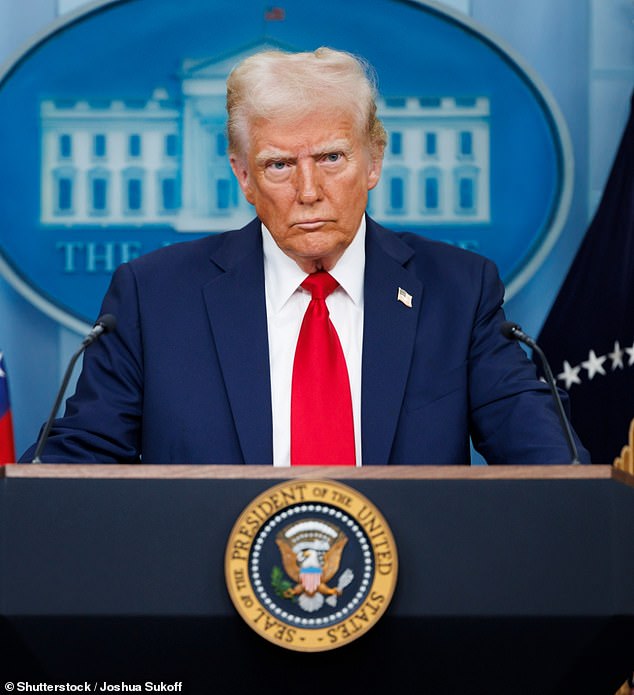Donald Trump has proved a bit of a party pooper. There we were last week, celebrating strong results from Microsoft and other members of the ‘magnificent seven’ clan, plus some decent figures here from several of our biggest enterprises, and pretty spectacular ones from Rolls-Royce.
The S&P 500 and FTSE 100 indexes of leading shares touched all-time highs. Trade negotiations seemed to be plodding along, with a decent deal between the US and the EU, even if businesses on the Continent were upset that it wasn’t as good as the agreement that we in the UK got.
Then, bang, the full list of tariffs was announced, coming into effect on Thursday for any country that had not closed a trade deal with the US. It includes some beefy figures. Switzerland was stunned to discover that it would be hit by a 39 per cent levy.
You may not feel sorry for what is one of the richest countries in the world but it’s rough on others. For example, South Africa gets 30 per cent and India 25 per cent.
These figures will almost certainly be negotiated down and there are all sorts of exceptions. But meanwhile there is huge disruption. Until the end of last week the view of the markets was that global business was nimble enough to cope. Now they are not so confident. And it isn’t only the Swiss enterprises that are being hit; it is also American ones.
You see that best in the impact on Amazon. It produced some stunning results on Thursday and the shares were trading around their all-time high, valuing the company at well over $2.5 trillion (£1.9 trillion). Then came the details of the tariffs. Its share price fell by more than 7 per cent.

Spoiler alert: Donald Trump has proved a bit of a party pooper with his latest tariffs
It’s silly to read too much into one day’s market movement, but it’s a useful reminder that Americans are being hit by Trump’s trade policy, not just foreigners.
We don’t know how the cost of the tariffs will be carried. Some may be absorbed by exporters. But they can only do that for a while as we have seen when there are sharp currency movements.
If the dollar suddenly weakens and they therefore receive less money in their own currency, exporters to the US eventually will have to increase their prices.
What we do have is a feel for the extra revenue the US expects to receive. Scott Bessent, the Treasury secretary, estimates it will be an extra $300 billion a year. That’s equivalent to about 1 per cent of national output. If a third of that ends up being paid by importers squeezing their margins and two-thirds by consumers in higher prices, that’s a noticeable dent on living standards. Some items will go up by a big amount, and while many won’t, the headlines will shock.
The tax revenue will be useful, of course, but as the US federal budget deficit is running at 6 per cent of national output, it doesn’t go far towards closing the gap.
What happens next? Disruption is never good and even if, as seems realistic, world trade does settle down, there will be lasting costs from the tariff war.
What will matter even more is whether, irrespective of all this, the US economy continues to grow at a decent clip. It managed to do so in the second quarter, at an annual rate of 3 per cent.
But there are worries. Every time there’s a weak number, as there was on Friday with jobs growth, the markets wobble.
The housing market has gone soft in many areas. Consumer sentiment is fragile, though up a little in recent months thanks to booming share prices. So markets need to stay strong to maintain consumer confidence – and vice versa. It’s a virtuous circle, but as we all know, that could flip.
You can see why Trump is so hostile to the Federal Reserve chairman, Jerome Powell. The one thing that might ensure the boom continues a while longer would be a cut in interest rates.
The Fed didn’t move last week, while here the Bank of England is widely expected to reduce rates on Thursday. It was a stunning July for British investors and shares here remain solid value compared with US markets.
The UK will probably gain from US tariffs, given the favourable deal we negotiated.
But August will, I am afraid, be a less comfortable month.
DIY INVESTING PLATFORMS

AJ Bell

AJ Bell
Easy investing and ready-made portfolios

Hargreaves Lansdown

Hargreaves Lansdown
Free fund dealing and investment ideas

interactive investor

interactive investor
Flat-fee investing from £4.99 per month

InvestEngine

InvestEngine
Account and trading fee-free ETF investing
Trading 212
Trading 212
Free share dealing and no account fee
Affiliate links: If you take out a product This is Money may earn a commission. These deals are chosen by our editorial team, as we think they are worth highlighting. This does not affect our editorial independence.
This article was originally published by a www.dailymail.co.uk . Read the Original article here. .

